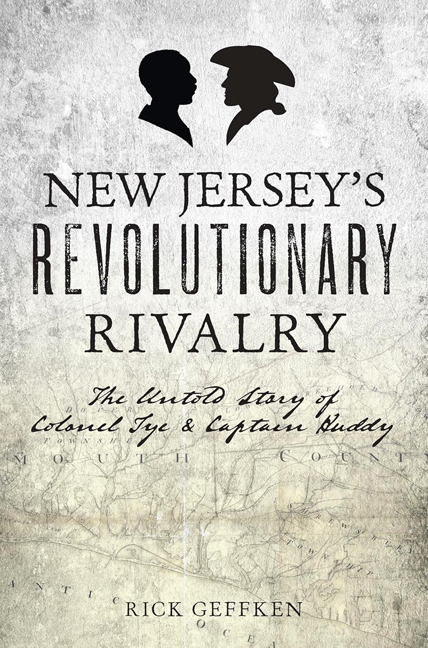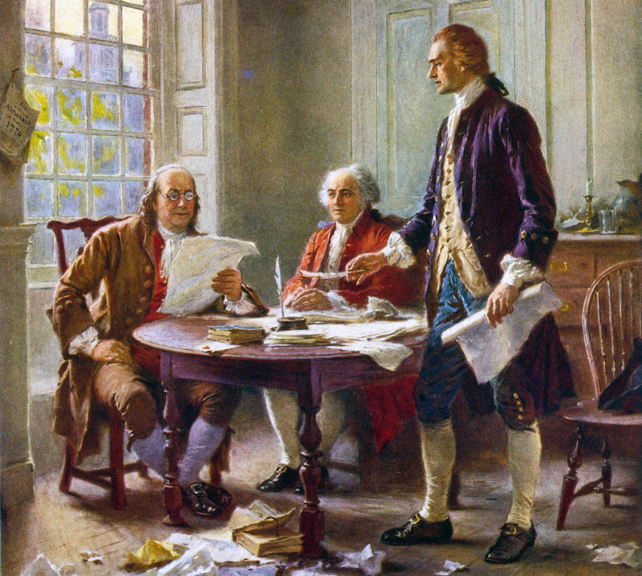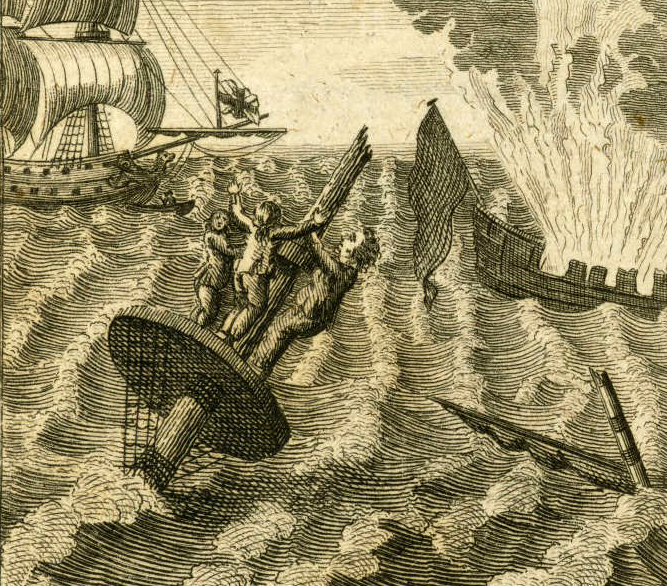“No taxation without representation” was not a notion born in the American colonies in 1765 with the passage of the Stamp Act, or with James Otis’s 1764 pamphlet The Rights of the British Colonies Asserted and Proved, or in his 1761 courtroom oration against Writs of Assistance. It was born with the “Pistole” fee in Virginia in 1753.
To better understand the notion, it is necessary to understand the affair that brought it on. Virginia was a royal colony, and all land issued by the royal governor was done so in the name of the Crown. The method of distribution was known as the Treasury Right System.
The securing or purchasing of land in the colony of Virginia was a three-step process:
- Step 1: Upon petition, the secretary of the colony’s land office issued a Right that authorized the county surveyor to conduct a survey of the specific acreage in question. A fee, paid by the purchaser, was required for the warrant.
- Step 2: When completed, the survey was returned to the secretary. If everything was in order, a patent, conferring legal title, was signed and embossed with a seal by the governor and a copy was entered into a patent book. There was no fee required for the patent.
- Step 3: Each year an annual payment called quitrent or Right-money was required by the Government; every fifty acres required a payment of five shillings. To maintain ownership, the building of a house and keeping a stock (seating) or the cultivating of an acre of land (planting) within three years was required. 1
Early in his administration Gov. Robert Dinwiddie complained,
It has been too long a Practice here [in Virginia], to have Orders for Land … return their Surveys, Works, and Improvements to the Sec’ry’s Office, by wh’ch they pretend to a legal right, and enjoy the Land for Years before they take out a Patent for them, by wh’ch the Crown has been greatly defrauded. 2
Dinwiddie was aware of this practice because prior to his appointment as lieutenant governor, he served as surveyor general for North and Central America.
On April 17, 1752, he obtained the unanimous consent of the Virginia Council, the upper house of the Virginia legislature that was appointed by the crown and answered to the governor, to levy a fee of one pistole (a Spanish gold coin equivalent to sixteen shillings and eight pence) for the signing and sealing of Patents.3 On October 6, Dinwiddie wanted to remove any doubt about the legality of the fee, so he submitted the matter to the Board of Trade and Plantation in England for its opinion.4 On January 17, 1753, the Board gave its approval. Little did the colonists know, but he had petitioned the Board of Trade for permission to levy the fee in August 1751 when he was informed of his appointment, but set sail for North America before the Board could act upon the petition.5
For the next ten months, the governor took no further steps because the House of Burgesses, the lower house of the Virginia legislature that was elected by and answered to the colonists, would not convene until November. 6
On November 22, the colonists of Henrico, Chesterfield, Cumberland, Albemarle, Amelia, and Dinwiddie counties complained to the House of Burgesses, “of an Unusual Demand that is made in the Secretary’s Office, as a Fee to his Honour, for signing said Patents, and the Use of the Seal.” 7 Most of these colonists were farmers, but some were land speculators. Rev. William Stith, the President of the College of William and Mary, rallied opposition with the slogan “Liberty, Property and no Pistole.” 8 He declared, “This Attempt to lay Taxes upon the People WITHOUT Law was certainly AGAINST Law, and an evident Invasion of Property.” 9 The House of Burgesses appointed three men, Carter Burwell, Charles Carter and Richard Bland, to draft a memorial to the governor asking by whose authority he demanded the Pistole fee. He informed the House that he had the unanimous support of the Council, the approval of the Board of Trade and by the powers he had received from the home officials before he left England.
On November 28, Dinwiddie announced that a fee of one Pistole would be charged for the signing and sealing of any patent. 10 Now a patent had to be taken out by a colonist immediately after the survey was recorded. It would no longer be allowed to hold land under warrants of survey only. As for the colonists in the west that had paid the survey fee but never filed for a patent so that they would not be listed on the rent rolls and required to pay the yearly quitrent, Dinwiddie required the payment of quitrents in arrears before they paid their Pistole fee. At the same time, he issued orders that patents could not be obtained by those colonists who had filed surveys before April 17, 1752, in other words, those who were in arrears, until he heard back from the Privy Council.
The Burgesses believed it was an arbitrary exaction by executive fiat. On December 4, they passed resolutions:
Resolved, That the said Demand is illegal and arbitrary, contrary to the Charters of this Colony, to his Majesty’s, and his Royal Predecessors Instructions to the several Governors, and the Express Order of his Majesty King William of Glorious Memory, in his Privy-Council, and manifestly tends to subverting the Laws and Constitution of this Government …
Resolved, That whoever shall pay a Pistole, as a fee to the Governor, for the Use of the Seal to Patents for Lands, shall be deemed a Betrayer of the Rights and Privileges of the People. 11
They also appointed Attorney General Peyton Randolph as a special agent tasked with delivering a memorial, also written by Burwell, Carter, and Bland, to King George III and obtaining, if possible, a redress of their grievances. When Dinwiddie learned that Randolph was offered the special agent position, he urged him not accept it, claiming it was in conflict with his position as an officer of the Crown. When Randolph disregarded his request, Dinwiddie declared the office of Attorney General vacant and then appointed George Wythe the new Attorney General. 12
Richard Bland wrote A Modest and True State of the Case following the passage of the resolutions. He denounced the fee, calling Dinwiddie’s proposal, “subversive of the Rights and Liberties of my Country.” He also stated that while other governors collected such fees with the approval of their legislatures, Virginia “cannot be deprived of the least part of their property without [the] consent” of their representatives.
The Rights of the Subjects are so secured by Law that they cannot be deprived of the least part of their property without their own consent. Upon this Principle of Law, the Liberty and Property of every Person who has the felicity to live under a British Government is founded. The Question then ought not to be about the smallness of the demand but the Lawfulness of it.
For if it is against Law, the same Power which imposes one Pistole may impose an Hundred, and this not in one instance only but in every case in which this Leviathan of Power shall think fit to exercise its authority …
This tax is indefensible …
If their Governors demand a Fee for every Public instrument they sign and they have no Law for such demand, they certainly do wrong, they demand that which the Law does not give them & therefore are guilty of taking from the subjects without legal authority … King James the first in the year 1609 by Letters Patent under the Great Seal of England granted all the Lands in Virginia to the Treasurer and Company of Adventurers, and gave them Power to make, ordain and establish all manner of Laws, Orders, Directions, Instructions, Forms and Ceremonies of Government and Majestracy fit and necessary for and concerning the Government of the said Colony and Plantation, and from Time to Time to distribute, convey, assign and set over such particular portions of Lands … upon his Majesty’s subjects as by the said Company should be nominated, appointed and allowed. 13
Bland argued that if the Burgesses did not fight this violation of the English constitution, then “like a small spark if not extinguished in the beginning will soon gain ground and at last blaze out into an Irresistible flame.” Dinwiddie wrote to the Governor of South Carolina, “W’t Influence You have over Y’r Assembly I know not, but I frankly tell You I have none over this here.” 14
In England, the Privy Council did not meet to hear arguments until June 18, 1754. This gave both sides ample time to prepare their arguments. Peyton Randolph with the assistance of Robert Henley and Alexander Forrester, presented the colony’s position; James Abercromby, former colonial agent for South Carolina, with the assistance of William Murray and Alexander Hume Campbell, presented the governor’s position. Henley and Forrester argued the following points:
- When Virginia’s Royal charter was granted, King James I gave the colony the power “to make and establish all manner of laws;”
- In 1689, Lord Howard of Effingham was denied the authority to levy “a signing and sealing” fee by the Privy Council;
- Governor Dinwiddie was granted authority “to settle fees,” not regulate them;
- The fee was a tax and an internal tax at that;
- The action deprived the colonists of their property without their consent.15
Murray and Campbell argued the following points:
- The King owned the land and could grant it on whatever terms he pleased;
- The King delegated his authority to his Royal agent, the Governor;
- A “signing and sealing” fee was charged in every other Royal colony;
- The Royal agent, unlike Lord Effingham, had secured the approval of the Council as instructed by the crown and Board of Trade before announcing the fee;
- The fee would provide an accurate rent roll and a means whereby land speculators could no longer defraud the King of his quitrents. 16
Even though some members of the Council considered the fee to be a tax, as Bland and the Burgesses did, on June 24, the Council rejected the petition. While it did order Dinwiddie to levy a fee only on patents of 100 acres or more,17 it denied him the right to collect quitrents in arrears for lands west of the Allegheny Mountains.
… the let’r from thence. [England] gives the People here all they desir’d, y’t is those y’t have occupied the Land for two years with’t Quit rents or any order for Pay’g the arrears, are now to have the Patents with’t and Charge w’tever, by w’ch the Crown will greatly suffer; however, I shall obey the order. [He was] much surpriz’d at the B’d of Trade’s Taciturnity, and not acting with more Spirit.18
In the end, both sides won and both sides lost. Dinwiddie firmly believed that he was acting within the limits of his authority and that the colonists were encroaching on the prerogative of the King, while the Burgesses firmly believed that a fee or tax could not be imposed on Virginians without first having their voice heard on the matter.
The Pistole fee and the disruption if caused in the governance of Virginia was a direct precursor ten years later to “No Taxation without Representation” associated with the Stamp Act.
1 Richard Slatten, “Interpreting Headrights in Colonial Virginia Patents: Uses and Abuses,” National Genealogical Society Quarterly, 75 (September 1987), 169–179.
2 “Governor Dinwiddie to the Lords of Trade, Oct. 25, 1754,” in Robert A Brock, ed., The Official Records of Robert Dinwiddie (Richmond: Wm. Ellis Jones, 1883), 1:363.
3 Henry R. McIlwaine and Wilmer L. Hall, eds., Executive Journals of the Council of Colonial Virginia (Richmond, 1925-1945), 5:385.
4 “Governor Dinwiddie to the Board of Trade, October 6, 1752,” Colonial Office Papers, Class 5/1327 (London: Public Records Office), 497-98.
5 Ibid.
6 Ibid., “The Board of Trade to Dinwiddie, January 17, 1753,” 5-7.
7 John Pendleton Kennedy and Henry R. McIlwaine, eds., Journals of the House of
Burgesses of Virginia, 1752-1758 (Richmond: Colonial Press, E. Waddey Company, 1909), 129.
8 Jack P. Greene, ed., “The Case of the Pistole Fee: The Report of a Hearing on the Pistole fee Dispute before the Privy Council, June 18, 1754,” in Virginia Magazine History and Biography, 66 (1958), 400-01.
10 “Governor Dinwiddie to the House of Burgesses, November 28, 1752,” in Robert A Brock, ed., The Official Records of Robert Dinwiddie (Richmond: William Ellis Jones, 1883), 1:45.
11 Kennedy and McIlwaine, eds., Journals of the House of Burgesses of Virginia, 154-55.
12 Ibid., 168-69.
13 Paul Leicester Ford, ed., A Fragment on the Pistole Fee, claimed by the Governor of
Virginia (Brooklyn, NY: Historical Printing Club, 1891), 31-43.
14 “Governor Dinwiddie to Governor Glen, April 15, 1754,” in Brock, ed., The Official Records of Robert Dinwiddie, 1:128.
15 Kennedy and McIlwaine, eds., Journals of the House of Burgesses of Virginia, 141, 143-44.
16 “William Murray, Lord Mansfield, Attorney General for the Governor, 18 June 1754,” George Chalmers Papers in the Manuscript Division (New York: New York Public Library, 1782); The Virginia Magazine of History and Biography, Vol. 66, No. 4 (Oct., 1958), 406-08.
17 “The Board of Trade to Governor Dinwiddie, July 3, 1754,” Colonial Office Papers, Class 5/1367 (London: Public Records Office), 94-100.
18 “Governor Dinwiddie to James Abercromby, July 23, 1754,” in Brock, ed., The Official Records of Robert Dinwiddie, 2:115.








3 Comments
Years ago I had an undergraduate student look into the origins of the “taxation without representation” phrase in a class on American political thought. She of course landed on Otis, “The Rights of the British Colonies.” Then later, in McCulloch’s biography of Adams, I noticed he implied that the phrase might have originated with Adams’ “Braintree Instructions” (1765), “We have always understood it to be a grand and fundamental principle of the [English] constitution that no freeman should be subject to any tax to which he has not given his own consent,” and that the phrase “had been used in Ireland for more than a generation.”
Your well-researched article on the Pistole fee adds a new element to the origin of the phrase, one I knew nothing about. And though I’ve never found anyone who originally stated the phrase “no taxation without representation” exactly, it seems we Americans have long employed “sound bites” to explain those complicated arguments about taxation without representation.
See our article about the origin of the phrase “no taxation without representation” here:
https://allthingsliberty.com/2013/05/no-taxation-without-representation-part-1/
Thanks for the link, Don. That also led me to Bell’s Part 2 article, which seems to nail the origin of the phrase “no taxation without representation,” to a London magazine title in 1768.
JAR can get to the nitty-gritty of details sometimes like no other source!